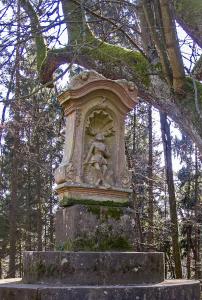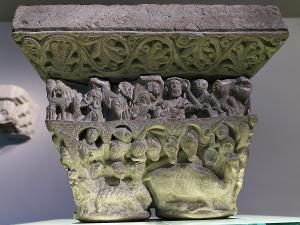 Because it is Holy Week, that crucial time of year in the life of every Christian, it seemed appropriate to peer back at the trip toward faith that my life has taken. In an earlier blog, I admitted that I cannot and do not believe in a physical resurrection, the supposed culmination of this week’s dark to light trip. I imagine that admission will call into the most serious question for many of Patheos’ more conservative readers the reality of my Christian faith at all. After all, one of their most vaunted heroes, N.T.Wright, published a 750-word defense of the belief in an actual physical resurrection of Jesus, The Resurrection of the Son of God, and for many that huge tome, from a well- recognized scholar of the Bible, settled the question. For me, all that book and others like it did was indicate just how slim any sort of historical evidence for that so-called event actually is. My faith is not based in any way on the ability to suspend the reality of facts, both historical and scientific, in order to hang belief on anything that may be thoroughly falsifiable. To the contrary, my faith journey began 50 years ago with a line-by-line reading of the book of Job.
Because it is Holy Week, that crucial time of year in the life of every Christian, it seemed appropriate to peer back at the trip toward faith that my life has taken. In an earlier blog, I admitted that I cannot and do not believe in a physical resurrection, the supposed culmination of this week’s dark to light trip. I imagine that admission will call into the most serious question for many of Patheos’ more conservative readers the reality of my Christian faith at all. After all, one of their most vaunted heroes, N.T.Wright, published a 750-word defense of the belief in an actual physical resurrection of Jesus, The Resurrection of the Son of God, and for many that huge tome, from a well- recognized scholar of the Bible, settled the question. For me, all that book and others like it did was indicate just how slim any sort of historical evidence for that so-called event actually is. My faith is not based in any way on the ability to suspend the reality of facts, both historical and scientific, in order to hang belief on anything that may be thoroughly falsifiable. To the contrary, my faith journey began 50 years ago with a line-by-line reading of the book of Job.
I was not raised in the church, save a 13-years-old baptism in the Disciples of Christ denomination, an event unaccompanied by any sort of instruction in the faith that culminated in my dunking in the pool of the church. We went to that church a time or two, but left for good when the pastor, pointing a finger at his head, announced “smoking was nothing less than suicide.” Since my parents both were smokers, the preacher’s words made them furious, angry enough to vacate the church, never to return. They took their four children with them. After that, Sundays became a time for leisurely lounging in bed, followed by TV sports, leading for me to hours of reading. I loved those Sundays, believe me! Church or religious talk were not involved in any way.
I attended a very secular college, Grinnell in Iowa, and was forced to attend chapel each Sunday, because that was the “penalty” for being in and continuing as a member of the college choir. The years were 1964-68, momentous days in US America’s history, highlighted by the war in Vietnam, the emerging women’s revolution, the struggle for civil rights, particularly for African-Americans, and the sexual revolution in general. On Sunday mornings in an often frigid Iowa chapel, I heard any number of anti- war, pro-women, pro-civil rights sermons from two regular “woke” preachers, along with any number of visiting orators, few of whose names I can recall. In fact, I remember well only one sermon from those days, given by Robert Short, the creator of the then wildly popular, Gospel According to Peanuts. Short proved a surprisingly conservative Christian, much to the shock and evident disgust of the nearly full chapel that day, despite the fact that he was a graduate of the generally liberal seminary that I was to teach in for 33 years. The other sermons I was present for registered very little if at all.
What certainly did register for me were two significant events: the Vietnam War, which was loathed by the vast majority of the students and faculty at Grinnell, and which loomed as a possible, if not likely, destination for those of us poised for graduation in 1968. I had no interest in becoming a soldier, and thus was looking for a means whereby I might avoid the draft. Conscientious objection for religious reasons was hardly an option for non-religious me, and I was far too cowardly to go to prison or head to Canada. Remarkably, the second event was to provide the way that would change my life forever. My now-wife of nearly 52 years, Diana, said to me after a lovely date that she liked me well enough, but could not imagine spending her life with anyone who was not a Methodist minister. I can only say that the call of God became loud at that moment, and I seriously began to consider ministry as a life vocation. Up to that point I saw myself as a teacher of English, and had had that vision for my entire conscious life. Yet, when I learned that IV-D on one’s draft card, deferment for ministry studies, was available for seminary attendees, the prospect of theological study grew considerably brighter. And a possible marriage to the person I loved added spice and joy to the entire scenario.
Off I went to seminary, and on a decided whim took Hebrew, because I enjoyed language study, and the stuff looked very funny. Again, the course of my life changed, and I fell madly in love with Hebrew, the language, the culture, the history of all things Old Testament. In fact, I thought for a time of converting to Judaism, so much did the religion affect my worldview. Though I remained a Christian, my Christianity did not always resemble that of the more traditional or familiar kind that many of my seminary colleagues espoused. That became obvious to me when I enrolled in my last year of study in a year long Hebrew class on the book of Job. Job’s book represents the most difficult language challenges in the Hebrew canon, fully 10% of which is plainly unreadable in the text as we have it. However, my teacher had written a doctoral dissertation on Job at the University of Toronto in 1959. On his dissertation committee was the famous English scholar, Northrop Frye, and my teacher’s interest in irony peaked both Frye’s interest and my own. Subsequently, my own dissertation, written under the direction of that same instructor, also wrestled with irony in the book, thus combining my old English literature interests with a serious religious study of a magnificent ancient biblical text.
I began in 1973 a life-long love of Job. I soon learned that the traditional ways of assessing the book were pallid and limited, and often plainly wrong, unfair to the richly nuanced text of the book. It was certainly not about the “faith of Job,” nor was it even about “innocent suffering,” not primarily at least, or the mystery of the goodness of God in a world of evil and pain. I discovered that it was about God all right, a God who far exceeded the ridiculous idiocies of Job’s friends, their “reward the good, punish the wicked” God, a God also revered by Job, too. That God who showed up in the storm at the end of the tale was indeed a God of power, but equally a God of mystery, surprise, wonder, and the marvelous creator of a world of grittiness and struggle. In short, the God of Job was the God I had been searching for in my faith journey, not one removed from the world but one enmeshed within it, in love with it, but also allowing human creatures to act as they choose, not forcing them, but luring them to new ways of thinking and being.
In addition, the God of Job warmed to the anguished questioning of the hero, and flat rejected the claims of the friends, naming them rightly “false” beliefs, nostrums at best, and announcing finally to Eliphaz that he “had not spoken right” as Job had (Job 42:7). I could readily believe in a God who liked to be questioned, not one that demanded devotion without question, who forced followers to bow the knee to superior power, to “surrender all” without enquiry. Doubt was not only acceptable; it was required if real faith was to be a discoverable commodity. Job, in short, led me to a viable and robust faith life, a life I have tried to live ever since I first encountered the old boy from Uz now nearly 50 years ago. Thanks to my superb wife, whose request for me to become a Methodist minister we learned later was in fact a deep desire on her part to become herself such a minister (she did just that later in her life, attending the seminary in which I taught), and thanks to Job, I am a Christian believer, devoted to the God who is devoted to me as we two journey together in a rich and complex faith to attempt to discover multiple ways to achieve at last some vestige of the realm and rule of God on the earth.
(Images from Wikimedia Commons)















